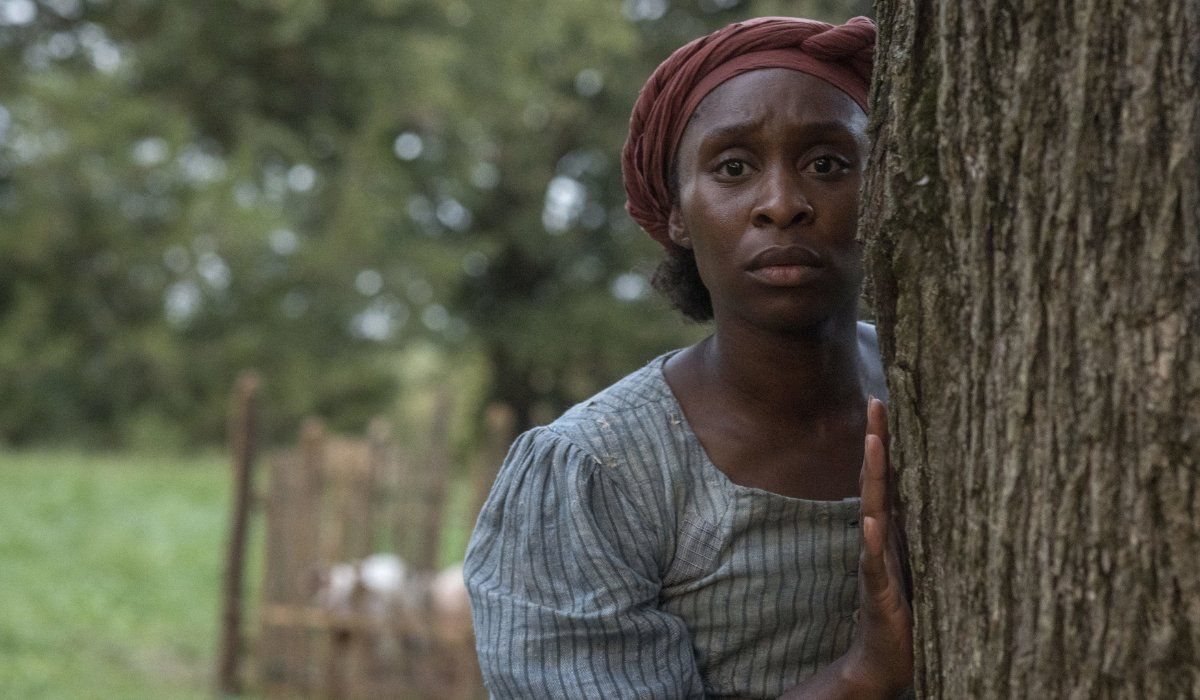It’s historical biopic season once again, as many studios are going to start finalizing their awards season competition material, and releasing them into the wild. Director Kasi Lemmons’ Harriet, the story of the life and times of former slave turned abolitionist Harriet Tubman, is certainly one of those hopefuls we’re about to see on the silver screen. But while Tubman’s story is certainly a tale we need to see told for modern audiences, the execution of that idea here is inconsistent - at times captivating and unique, while in other moments totally rote and too theatrical in its intent.
The story of Harriet follows its titular protagonist (Cynthia Erivo) as she escapes the plantation on which she and her family works after her master (Joe Alwyn) denies them their legally-owed freedom. After a narrow escape, Harriet makes a harrowing journey to Philadelphia, where her encounters with a fellow abolitionist (Leslie Odom Jr.) and an inspiring friend (Janelle Monae) lead her to become a conductor on the Underground Railroad, leading countless others to the freedom they so richly deserve.
The sum total of what Harriet is aiming to do in terms of bringing history to life makes this film a perfectly standard historical product that one would expect to see at this time of year. It follows a typical A-to-C path of who Harriet Tubman started out as, who she would become, and how she got there, in a perfectly laid out path. If you took the basic biopic formula of a cradle to grave biography, and removed both of those bookends, you’d get the basic gist of what Harriet is about.
With a lot of focus on the middle act of Tubman’s life and exploits, the film tends to drag in the earlier half, as a lot of time is spent on Harriet’s initial escape. That’s just another example of the atypical pacing of Harriet’s finished product, as the exploits of Harriet Tubman and the Underground Railroad come towards the middle of the film, and seem to breeze by quickly. However, that storytelling seems to have been by design.
Co-writer Gregory Allen Howard, along with director/co-writer Kasi Lemmons, have attempted to create in Harriet a film that demystifies Harriet Tubman’s legacy, delving more into her personal struggles and triumphs that put her on the path to her historical actions. While this approach doesn’t work as well as they might have wanted, it’s certainly refreshing to see a historical story where the central figure is getting the attention they deserve in a new way.
Cynthia Erivo is absolutely captivating as Harriet Tubman, as her star continues to rise in the world of film. Drawing Ms. Tubman with a level of depth that the history books tend to overlook, her heroics are balanced out by her very human need to save as many as she can, or die trying. That sort of forceful bravado, tempered with her own personal hurt, makes Harriet’s focal character a three dimensional being, rather than an historical cipher to be taught as a milestone in human history.
Once the movie hits its second act, and the real meat of Harriet’s historical events kick in, the rest of the film operates at a speed and detail that is exciting to behold. Daring Underground Railroad runs, set to the tune of Nina Simone’s "Sinnnerman" are absolutely exhilarating, and seeing the proceedings that move the path to freedom along the rails of history are some of the moments where the film comes most alive.
And yet, there are a handful of moments involving Erivo’s Harriet that get bogged down in the style of the traditional Oscar nomination clip reel. Several moments have Harriet giving a rousing speech, with the music swelling, and her purpose in history known, and it’s those portions of Harriet’s narrative that really hold it back from being a unique picture. Just when the film seems to find its groove, it slows back down and takes the standard footing, knocking the narrative off pace and back into formula.
Harriet is an essential film, in the sense that it tells a side of history that we still don’t see enough of at the box office. With Harriet Tubman’s epic story being told with a more personal scale, we see the person behind the history quite well. But with the stylistic flourishes and over-dramatized moments that are typical of a more routine cinematic experiences, the film weighs itself down to an unfortunate degree that hampers pieces of the entire movie.
While Harriet’s history is undeniably vital to the history of the United States, and is still resonant in today’s culture, its storytelling method only makes it halfway into the present, stuck at times in the tropes of the past.

Mike Reyes is the Senior Movie Contributor at CinemaBlend, though that title’s more of a guideline really. Passionate about entertainment since grade school, the movies have always held a special place in his life, which explains his current occupation. Mike graduated from Drew University with a Bachelor’s Degree in Political Science, but swore off of running for public office a long time ago. Mike's expertise ranges from James Bond to everything Alita, making for a brilliantly eclectic resume. He fights for the user.
Most Popular






